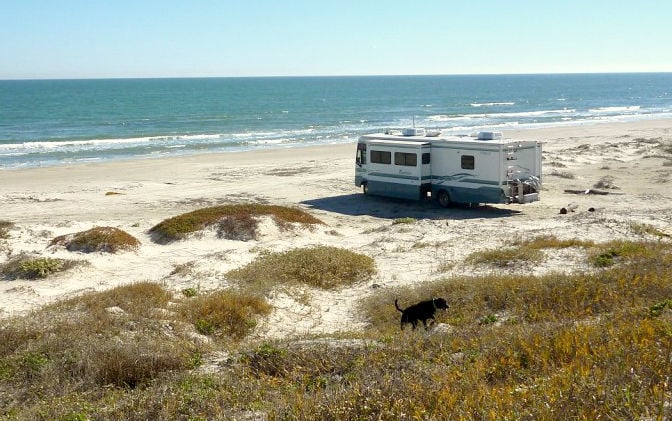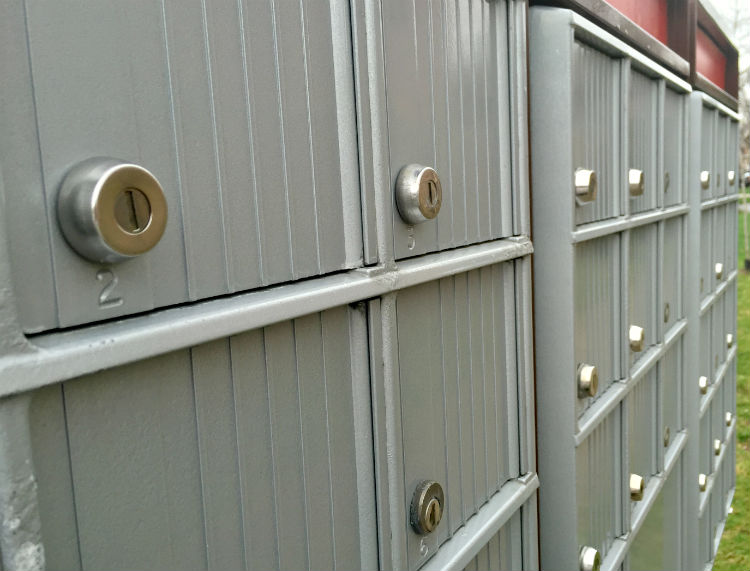
Its common to be isolated from the “real world” while on the road and receiving mail may be a little tricky. Perhaps jump in to a full-timing discussion forum today to learn more.
We live in a digital age and the stamped letter is slowly fading away into history. Surprisingly however, one of the biggest surprises of transitioning to the full-timing lifestyle is the need to have a physical, legal address. Everyone needs one to get mail on the road, bank, obtain health insurance and more.
Where will you get mail on the road when you’re here?
How you decide to get mail on the road differs on everyone’s unique situation but here’s a rundown on the two common ways most full-timers handle this dilemma.
Friends and Family Mail Forwarding

Its not uncommon for friends or family to help out by allowing you to forward all of your mail to their address.
Friends and family are often excited to live vicariously through their loved ones’ new full-timing adventure. Many will generously offer their home address to their vagabonding relatives and some will even be happy to handle mail needs too. But even with the best intentions, this is usually a mixed bag of pros and cons — mostly cons. That’s because most people just don’t know what they’re getting into.
For example, think back to the time you received an urgent piece of mail that needed some kind of action taken, stat. Whether it was a legal document that needed signing or a warrant for your arrest, time sensitive mail for a full-timer requires the sender to pony up cash and get it to the wayward RVer asap. Unless you can structure a specific arrangement for every possible mail scenario, it’s a bad idea to take advantage of unsuspecting friends and family members’ offers to help with mail.
In addition, using someone else’s address for things like insurance and taxes is risky. If an institution discovers you aren’t actually living in that property, you can be disqualified for benefits, fined and generally run up the flagpole by institutions who base their rates and other services on your home address.
A Better Way to Get Mail on the Road: Mail Forwarding Services
Most full-time RVers use a dues-based mail forwarding service. These businesses cater to full-timers and enable members to obtain a physical address for everything from receiving mail and packages to registering their vehicles. Mail forwarding services are popular in U.S. states that don’t impose personal income tax on residents. Some of these tax-free states include Florida, Texas, South Dakota and Nevada.
Many full-timers use their mail-forwarding service as a way to establish a “domicile” in that state. This sends the message to bureaucrats and institutions that you really do exist and have a place to call “home” – even if it is a mail box on a wall with 1,000 others.
The biggest problem with using a mail forwarding service for this is that oftentimes their address is legally zoned as a commercial location, not a residence. What this means to you is that some institutions will insist on a legally recognized residential address. Many RVers have joined mail forwarding services only to wind up frustrated when trying to open bank accounts or apply for health insurance, among other chores.
The Escapees RV club offers one of the biggest and longest-running mail-forwarding services that helps full-timers get mail on the road. Because the service is run by RVers with staff that understands the unique needs of full-timers, it’s also a hassle-free way to establish a legal domicile that almost every institution will accept. Today the club’s “Home” program offers the service in Florida, Texas and South Dakota.
Getting mail on the road is a hot topic in the full-time RVing community. You’ll never be at a loss for opinions about this dilemma from other full-timers who’ve done it. If you’re planning on hitting the road, jump in to a full-timing discussion forum today to learn more.

I do not intend on changing my bank account in SC. Would that stop my social security and pension from direct depositing my check?
No, if that is where they are direct deposited now.
The question really isn’t about the bank you use, but how to keep your state of domicile as a legal resident in a state other than SC like TX, FL or SD.
.
If you do not have a bank account in the state in which you are claiming residency then your status could be challenged.. I certainly understand if you have a strong relationship with a banker, why you might not want to change. If that is the case and your SC banker knows you are a Full Timer, you might consider opening an account in your domicile state with a minimum deposit. If you are familiar with online banking you could link your SC account, and from time to time transfer a few dollars back and forth between accounts to show activity in the domicile account. Bank of America and Chase are two you might consider.
Caution. If state where SS checks are deposited taxes SS benefits, it may cost you. How much you make is a portion of the comfort equation. How much you keep is the bottom line. You should consider income deposit locations to avoid being taxed in former state/s.
Is Florida still a good place to have as a home address,as of the Real ID act?
Ted, I think that the best domicile really depends on many factors, such as what kind of health insurance you need, whether or not you own property, etc. The Real ID act is only a problem if you attempt to use a UPS store or something similar as a your primary residence. This has never been allowed as far as I know, even before the act.